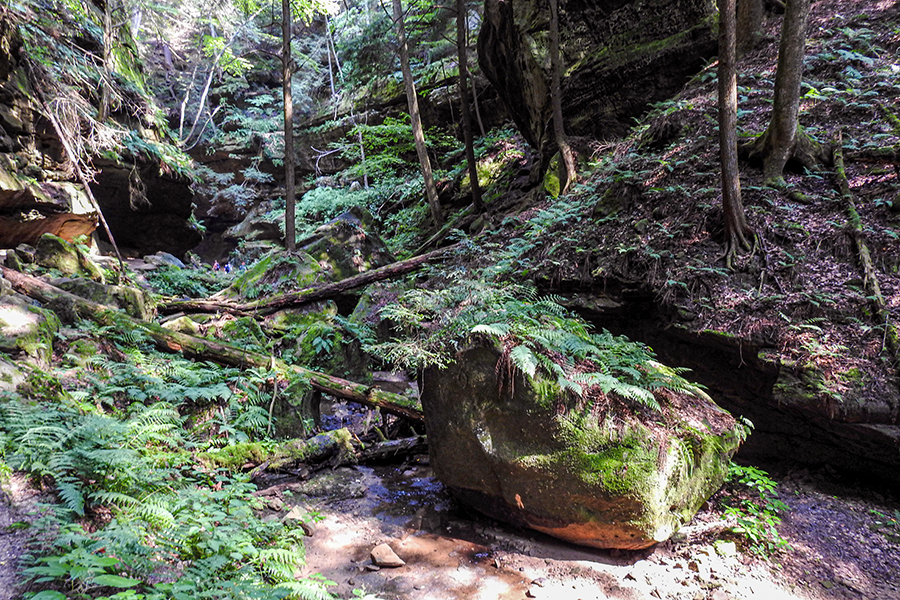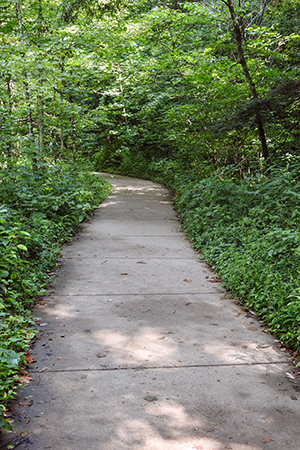Rockbridge Hocking Hills

"I like this place and could willingly waste my time in it." ~ William Shakespeare
CONKLE'S HOLLOW STATE NATURE PRESERVE
LOWER FALLS TRAIL
About Conkle’s Hollow State Nature Preserve
Conkle’s Hollow is an Ohio State Nature Preserve located in the picturesque Hocking Hills. It is comprised of 87-acres and has 2 hiking trails.
In 1925, the State of Ohio purchased Conkle’s Hollow to preserve the land and its scenic beauty. In 1977, Conkle’s Hollow was dedicated as a State Nature Preserve. This land was named after W.J. Conkle. His name with the year 1797 was found carved in the sandstone.
Conkle’s Hollow’s State Nature Preserve is a beautiful park. There are deep gorges and sheer Black Hand sandstone cliffs. You can also find plenty of wildlife, waterfalls, and native Ohio plants and flowers.

THE LOWER FALLS TRAILS

There are 2 trails located in Conkle’s Hollow State Nature Preserve:
Lower Falls Trail (aka Gorge Trail)
Rim Trail (East Rim Trail & West Rim Trail)
During our latest trip to Conkle’s Hollow State Nature Preserve, we only walked the Lower Falls Trail. We will be doing another post soon for the Rim Trail.
The Lower Falls trail is a nice, peaceful, relaxing trail that can be enjoyed by anyone. Since you are down in the gorge, the temperature is usually cool and comfortable. If you are looking to take a leisurely stroll in the Hocking Hills, this trail is a great choice.

The trail starts off at a bridge. After you make it over the bridge, the trail is made of concrete. It continues a short distance, then turns into a wooden boardwalk. After another short distance, it turns into concrete again. This section of the concrete trail ends in the shadow of Conkle’s Hollow’s Highest cliff. The Lower Falls Trail is wheelchair and stroller accessible to this point.

After that, the concrete trail ends you make your way through the opening of two large fallen Blackhand Sandstone slump blocks. The trail from there is all natural and rough in areas. There is nothing extremely strenuous, but it is not suitable for a wheelchair or a stroller.

Once you make it to the end of the natural bath, you will find yourself at the end of the Gorge Trail. The end of the trail is surrounded by towering sandstone walls and waterfalls. The waterfalls are not always active. If you are planning on visiting to see the falls, you would want to visit the park after it rains.
The day we visited, the waterfalls were dry. However, there were a lot of people walking in the very shallow water at the base of the falls. For this reason, I did not get a picture of the back of the gorge.

BIRDING
Conkle’s Hollow State Nature Preserve is a great place to bird during migration. During our recent visit, the birds were few and far between. But we did have an amazing surprise, we spotted a barred owl on the lookout for its next meal.

THE SIGNS
Below are all the signs located throughout the park. When visiting, it can sometimes be hard to get to read them all. So, here they are just for you.

Conkle’s Hollow is a picturesque 87-acre state nature preserve nestled in the emerald beauty of the Hocking Hills. Dedicated as a scenic nature preserve in 1977, Conkle’s Hollow is endowed with a rich variety of natural features.
Once past the rich bottomland of the gorge opening, one notices the valley beginning to narrow. Towering sandstone cliffs become increasingly visible through the hemlocks and hardwoods of the hillsides. Waterfalls cascade over moss-covered rocks in the side valleys during the seasonal wet periods. Wildflowers carpet the gorge floor in April and May of each year.
Those seeking a greater challenge will discover the Rim Trail to be a memorable experience. This two-mile loop trail winds along the high cliffs overlooking the gorge valley. Here, amid chestnut oaks and Virginia scrub pines, grow such dry-habitat species as mountain laurel, blueberries, deerberries, trailing arbutus, lichen and stemless lady’s slipper. The numerous natural overlooks give visitors one of the most scenic vistas in Ohio.
As you enjoy the serenity and natural beauty of Conkle’s Hollow, do so in a safe manner. By remaining on the designated trail system at all times, visitors and the fragile plant communities are protected from injury.
Enjoy Ohio’s natural preserves – naturally!

The valley of Pine Creek is an excellent example of a river birch community. Found primarily in southeastern Ohio and the Southern United States, the river birch (Betula nigra) is found mainly along smaller streams that are prone to frequent flooding. Such floodplains are home to many species of trees and wildflowers. Striking flowers, such as Virginia bluebells, trout lily, cardinal flower and ingstem, provide a colorful contrast to the muted bark of the sycamore and musclewood trees.

The rugged beauty of the sandstone cliffs found in the Hocking Hills belies the delicate ecosystem they support. Home to several rare and endangered plant species, the weathering of the sandstone rock provides just enough soil in cracks and crevices for their acid-loving roots. This harsh environment supports the colorful round-leafed catchfly, wild columbine and a collection of redacious lichens spleenworts. The preserve is also home to the rare Sullivantia and Canada yew.
Staying on the designated trail is the best way visitors can help make sure this most unique ecosystem continues to thrive.

The stately evergreen hemlocks of Conkle’s Hollow gorge are relics of a time when massive ice sheets halted their approach just miles from the preserve. In the Hocking Hills region, the eastern hemlock (Tsuga canadensis) grows primarily in the cool, moist hollows. Easily identified by the two white stripes on the bottom of each needle, the hemlock creates an atmosphere similar the boreal forests of Canada.
Although capable of living 900 years, most old growth hemlocks in this area were harvested soon after settlement. The bark, high in tannic acid, were used for tanning leather, and the needles, which are high in vitamin C, helped prevent scurvy among settlers.

The definition of a grotto is a small cave usually with attractive features. For those of you with imaginative minds, the shape of a horse’s head can be seen on the back wall of this small recess. You may at this point leave the concrete trail and take the steps up into the cave for a closer look – although the horse’s head can be best seen from the concrete trail.
- Please Remember –
Hiking off trail in the creek or on the hillside is strictly prohibited. Violators may be cited for hiking off trail pursuant to the Ohio Administrative Code.

The massive blocks of sandstone, which litter the valley floor of Conkle’s Hollow, are called “slump blocks.” At one time, these blocks were firmly attached to the bedrock walls of the hollow, but gradual erosion and the hand of time have caused the blocks to fall from their original lofty positions. Because these blocks side imperceptibly down the hillside on which they lie, they are also knows as “float blocks.”

The rock outcrops, which can be seen throughout Conkle’s Hollow, are comprised entirely of Black Hand sandstone; a sandstone formation extending in a narrow band from the Ohio River, northward nearly to Lake Erie in eastern Ohio. The Black Hand sandstone is divided into three layers. The top and bottom layers are strongly cemented together while the middle layer is much softer and erodes much easier. It is in this softer portion of the Black Hand sandstone that recesses or re-entrant caved often form. The yellow, orange and red colors on the rock are evidence of the iron oxide which binds the sand grains together.

The concrete trail ends here in the shadow of Conkle’s Hollow’s Highest cliff. Feel free to continue on the dirt trail that leads to the end of the Gorge Trail. You will pass the locations of several waterfalls (most are dry in summer and autumn) along this somewhat more difficult section of trail due to projecting rocks and roots in the trail surface.
- Please Remember –
Hiking off trail in the creek or on the hillside is strictly prohibited. Violators may be cited for hiking off trail pursuant to the Ohio Administrative Code.
OUR THOUGHTS
We love Conkle’s Hollow State Nature Preserve and visit it at least once a year. If you are in the mood for an easy Hocking Hills hiking experience, walk the lower falls trail. If you are wanting a more strenuous workout, the upper rim trail is a good choice. And there are fewer people that choose to walk that trail.
The only problem with Conkle’s Hollow (and most of the Hocking Hills Parks) is the parking. The lot at Conkle’s Hollow is extremely small. People end up parking in the grass along the driveway. So, there have been times we visited the Ohio park and there was not a single spot available. The only choice is to leave and come back. Or keep driving through the parking lot until someone pulls out.
If you are looking for what to do in Hocking Hills that is relaxing, we would definitely recommend the Conkle’s Hollow State Nature Preserve Lower Falls Trail.
WHAT TO EXPECT AT CONKLE'S HOLLOW STATE NATURE PRESERVE
Please note that trail rules and regulations can change at any time. The following information was in effect for Conkle's Hollow State Park in Rockbridge Hocking Hills as of August 2021.


There are bathrooms located in the parking area.

Bicycles are not permitted.

There was quite a bit of activity during migration.

Several small foot bridges located along the trail.

Concealed carry is permitted.

Dogs are not permitted.

Trail surfaces are concrete, wood and natural. The first 2/3 of the trail is level. The second part of the trail has some moderate areas to navigate.

The parking lot is blacktop. There are 63 parking spaces that fill up fast.

Picnic tables are located near the bathroom.

No playground.

There are a couple of benches.

A lot of shade.

No shelter house.

Trail is not marked. However, you cannot mistake where it is at.

No trashcans along the trail.

Waterfalls

There are 6 ADA parking spots. The first 2/3 of the Lower Falls Trail is wheelchair accessible.






































